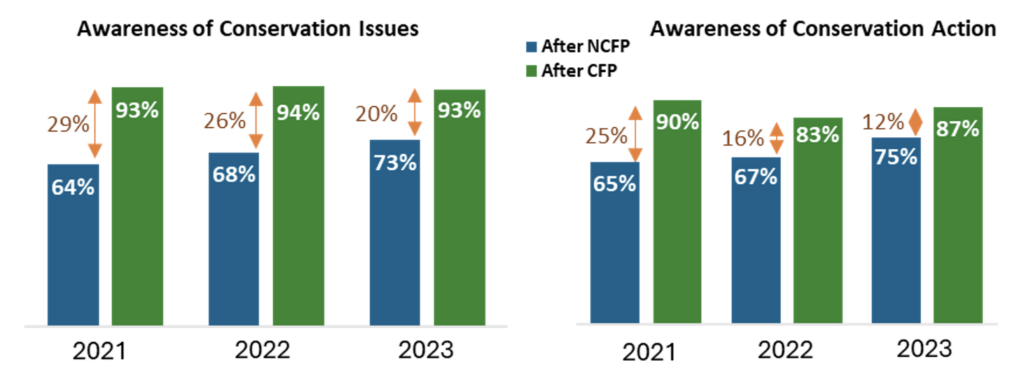My name is Delaney Wellington (she/her), and I’m an Evaluation Associate at the Wildlife Conservation Society (WCS). WCS runs five New York City wildlife parks – the Bronx Zoo, Central Park Zoo, New York Aquarium, Prospect Park Zoo, and Queens Zoo – and conducts conservation work and research around the world. I study the impacts of our education programs on school children, teachers, families, youth, and adults. In our strategic plan, we aim to make every visit to the zoo an opportunity to spark conservation action.
With this intention in mind, it’s imperative that we use data to measure the impact of conservation messaging on our program audiences. Our field trips, which reach over 300,000 students per year, present an exciting opportunity to share these messages by making ties to conservation issues and actions taking place here in New York City, as well as globally.
All WCS field trips address wildlife science and include some conservation messaging. However, a few of our offerings explore a specific conservation issue (e.g. climate change) more deeply and highlight ways that students can contribute to wildlife conservation. To understand the impact of this focused messaging, we split our school programs into two categories, Conservation Focused Programs (CFPs; e.g. Conservation Innovation) and Non-Conservation Focused Programs (NCFPs[RG1] ; e.g. What makes a Shark a Shark?). We compared teacher survey feedback from school years 2021-2023 in CFPs and NCFPs.
Our analysis indicated that teachers whose students participated in CFPs were more likely to agree that students walked away with a deeper awareness of conservation issues and actions (83%-94%) than those who participated in NCFPs (64%-75%). We also found that NCFPs got better each year at increasing awareness of conservation issues and actions and are moving towards closing the gap with CFPs (Figure 1).

Lessons Learned
- Teachers believe CFPs consistently work to educate students about conservation issues and actions. CFPs are structured entirely around conservation topics to build empathy with wildlife, teach students about conservation issues, and give them actionable ways to help.
- Conservation is interconnected: not all programs have to be explicitly about a conservation issue to embed conservation learning. In 2022, lesson plans were restructured to include an explicit connection to conservation that is shared visually and verbally in all programs. This shows us that conservation can be connected to any topic and should be so that every program, regardless of science focus, is an opportunity to gain awareness of conservation issues and actions.
- Honing our conservation messaging will increase conservation learning outcomes. NCFPs getting better over time is an example that there’s growth potential.
Hot Tip
Evaluate your evaluation: Take a moment to reflect on your evaluation process. Ask yourself or your team what’s working and what’s not? Are there steps you can take to make your process easier or streamlined? In our case, we changed the way we ask teachers about conservation learning outcomes to better understand the impact of our programs.
Rad Resource
Join a North American Association for Environmental Education affiliate group! You’ll gain access to resources, news, and opportunities to not only advance your knowledge but take part in the conversation surrounding environmental education and evaluation.
The American Evaluation Association is hosting Environmental Program Evaluation TIG Week with our colleagues in the Environmental Program Evaluation Topical Interest Group. The contributions all this week to AEA365 come from our EPE TIG members. Do you have questions, concerns, kudos, or content to extend this AEA365 contribution? Please add them in the comments section for this post on the AEA365 webpage so that we may enrich our community of practice. Would you like to submit an AEA365 Tip? Please send a note of interest to AEA365@eval.org. AEA365 is sponsored by the American Evaluation Association and provides a Tip-a-Day by and for evaluators. The views and opinions expressed on the AEA365 blog are solely those of the original authors and other contributors. These views and opinions do not necessarily represent those of the American Evaluation Association, and/or any/all contributors to this site.

Delaney – I’d love to see your report and learn more about how you identified and tract conservation behaviors. I’ve been working with a client on this for years and we think we finally found a good method with students, but really love to know more about what you do and how you do it and see if we can, benefit from that and enhance our evaluation for next year. Thank you.